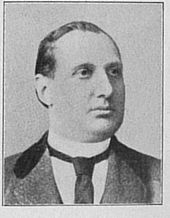Catholic People's Party (Baden)
The Catholic People's Party of Baden was a forerunner organization of the German Center Party in the Grand Duchy of Baden from 1869 to 1888 .
history
In connection with the Baden Kulturkampf between the government of the Grand Duchy of Baden and the Archdiocese of Freiburg , Jakob Lindau (the initiator of the casino movement ) and Ferdinand Bissing founded the Baden Catholic People's Party in 1869 . The aim was to mobilize the Catholic population for the church and to exert political pressure.
In the 2nd Chamber of the Baden Assembly of Estates , the Catholic People's Party was able to take the following number of seats out of 63 seats:
| year | 1870 | 1871 | 1873 | 1875 | 1877 | 1879 | 1881 | 1883 | 1885 | 1887 |
|---|---|---|---|---|---|---|---|---|---|---|
| Seats | 5 | 9 | 10 | 13 | 12 | 15th | 23 | 19th | 14th | 9 |
Pastors Heinrich Hansjakob and Franz Xaver Lender also belonged to the MPs of the People's Party . Although around two-thirds of the population was Catholic, the People's Party and later the Center Party in Baden were only able to win around 30-40% of the Catholics in Baden who were eligible to vote. The People's Party was mainly successful in rural areas, while it lagged well behind the National Liberals in the cities . Since there were only representatives of the constituencies in the second chamber and these were elected indirectly by electoral colleges, the smaller parties were not represented proportionally to the votes in the chamber. The People's Party therefore called for the direct election of the deputies.
The People's Party strove for a greater German unification of Germany because it assumed that Catholic interests would only be sufficiently taken into account in a state with Austria. Protestant Prussia was seen as a threat. Therefore, during the Franco-German war, the People's Party was assumed to secretly wish for a victory for France, while it emphasized its loyalty to Germany.
In 1888 the Catholic People's Party in Baden joined the Catholic Center Party of the Reich. At this time, the social wing in the Baden Catholic Party also gained in importance. The party chairmanship passed from Franz Xaver Lender to Theodor Wacker .
literature
- Reinhold Baumstark : The Catholic People's Party in Baden and its relationship to the war against France , Freiburg i.Br. 1870 digitized from Google
Individual evidence
- ↑ table on www.wahlen-in-deutschland.de
- ↑ Irmtraud Götz von Olenhusen: Clergy and deviating behavior , Göttingen 1994, p. 388
- ↑ see Baumstark
- ^ Tobias Wöhrle: President Leo Wohleb (1888–1955). Catholic Baden, German, European. In: Konrad Adenauer Foundation. Archive for Christian-Democratic Politics, Konrad-Adenauer-Stiftung (Ed.): Historisch-Politik Mitteilungen, Vol. 15 (2008), p. 193
